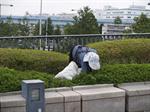 HORTICULTURE RESOURCE MANAGEMENT COURSE
HORTICULTURE RESOURCE MANAGEMENT COURSE
This broad ranging course provides a sound introduction to management in horticulture.
It covers planning for efficient and economical management in horticulture including such things as: work procedures and programming, budgeting and staff supervision. The course is relevant to all areas of horticulture including nurseries, parks, private gardens, market gardening and fruit production.
 COURSE CONTENT
COURSE CONTENT
There are ten lessons in this course as follows:
- Horticultural Business Structure
- The legal structure of business
- Business names
- Starting a business
- What services can be offered
- What is required to offer horticulture services
- Marketing guide
- Management Practices
- The role of management
- Business planning
- Preparing a horticultural business plan
- Horticulture and the Law
- Quality management systems
- Contracts and offers
- Consumer law
- Structure of small businesses
- Legislation of small businesses
- The law and business
- Protection of consumers
- Stamp duty
- Staff Management
- Managing staff
- Managing as a leader
- Interviewing, recruitment and staff induction
- Staff training
- Visual and resource for induction and training
- Job descriptions
- Supervision
- Role of the supervisor
- Supervision
- Communication with employees
- Communication Barriers
- Improving leadership skills
- Giving directives and introducing change
- Financial management
- Budgets
- Financial assistance
- Taxation
- Liquidity
- Costing guide
- Billing
- Summary of market for landscape services
- Ways of buying business
- Improving Plant Varieties
- Where cultivars come from
- Plant variety rights (PVR)
- Owning plant names
- Genetics and plant breeding
- Self-pollinating species
- Productivity and Risk
- Improving productivity
- Problem solving and decision making
- Group decision making and problem solving
- The planning process
- Time management
- Planning expenses
- Monitoring, evaluating and regulating the progress
- Sensitivity Analysis
- Insuring the business
- Managing Physical Resources
- Managing equipment, buildings and machinery
- Using flow chart to improve productivity
- Record keeping
- Filing
- Keeping records of business activities
- Developing a Horticultural Business Plan
- Developing a business
- Managing business growth
- Business plan for nursery
- Marketing guide for gardening ana landscape businesses

Examples of things you may be doing:
- Compare the organisational structures of different horticultural enterprises.
- Determine the value of a business plan to a horticultural business.
- Determine the significance of consumer law to horticultural business.
- Determine the duties of different supervisors, in a specific horticultural enterprise.
- Describe how a budget is applied to managing a specific horticultural enterprise.
- Determine the criteria for selecting staff to work in an horticultural enterprise.
- Explain the system for controlling the collection of royalties on a plant which is covered by plant variety rights.
- Monitor and recommend improvements to a specified work task in a horticultural enterprise.
SCOPE OF HORTICULTURAL ENTERPRISE
Horticultural enterprises can be small or large, and diverse or narrow, in the scope of what they offer in services or products. These may include any of the following, and more:

Lawn Mowing - normally done on a weekly or fortnightly basis. It may include trimming edges on each cut, on every second or third cut, or not at all. It may be a "quality cut" service, for top quality lawns using top quality cylinder mowers. Or it may be a basic cutting service using standard rotary type mower.
Pruning - this service may be provided as part of a routine maintenance contract which you attend to every week, fortnight or month. Pruning is also done as a once off, or once a year job.
Tree Lopping - removing unwanted branches from trees (they might be dangerous, getting too near a building, or simply not wanted by the customer). This is normally a once off job only. You need special equipment and skill to do this safely and properly and correct education and training.
Tree Surgery - a highly specialized area of tree work requiring more skill and experience than tree lopping.
Weeding - sometimes a one-off job, more commonly part of a regular maintenance contract.
Pest Control - normally involves identifying and spraying to control insects, fungal or other pests.
Chemical Weed Control - implementing a spraying program to control weeds.
Lawn Renovation - repairing and improving an existing lawn; involves such things as topdressing, weed control, thatch removal, aerating, feeding, etc.
General Garden Maintenance - employed on a weekly or fortnightly basis for a set number of hours to do all the jobs needed to care for the garden i.e. feeding, watering, weeding, lawn mowing, pest control, pruning, etc.
Rubbish Removal - often included in a gardening job and often expected! Many gardeners do not offer this service, others do. You should be clear to indicate whether you do, or do not do, remove rubbish.
Garden Renovation - normally a one-off job involving weeding, pruning, spraying, replacing dead plants, additional planting and minor landscaping.
Landscaping - usually a more major contract than other garden services. Involves such things as earthworks, rock work, drainage, lawn construction, paving, planting, etc. In some countries you now need to have a license to do landscape construction. Licensing is generally administered by a building licensing authority/branch, or something similar.
Nursery - propagating plants for sale; this may be a small backyard operation or larger venture; also buying in and re-selling plants.
Market Gardening - growing vegetables, herbs or cut flowers in glasshouses, hydroponics or in the open ground.
Fruit Growing – orchard or berry farming.
Viticulture - grape growing for fresh or dried fruit or wine.
What This Course Can Do For You
This course is applicable to all areas of horticulture from tree surgery to garden maintenance, and landscaping to horticulture retail. All businesses use resources, be it equipment, products or manpower. All businesses must run efficiently if they are to survive and thrive. Take this course to learn how to best run or manage any horticulture-related enterprise. The course is ideally suited to those working in:
- Horticulture Management
- General Horticulture
- Landscaping
- Nursery Management
- Garden Retail
- Garden Maintenance Services
- Turf Industry
- Arboriculture
WHAT NEXT?
Register to Study - Go to panel toward top of this page (right column)
or
Get Advice - Use our FREE COUNSELLING SERVICE to contact a tutor
CLICK TO CONTACT US